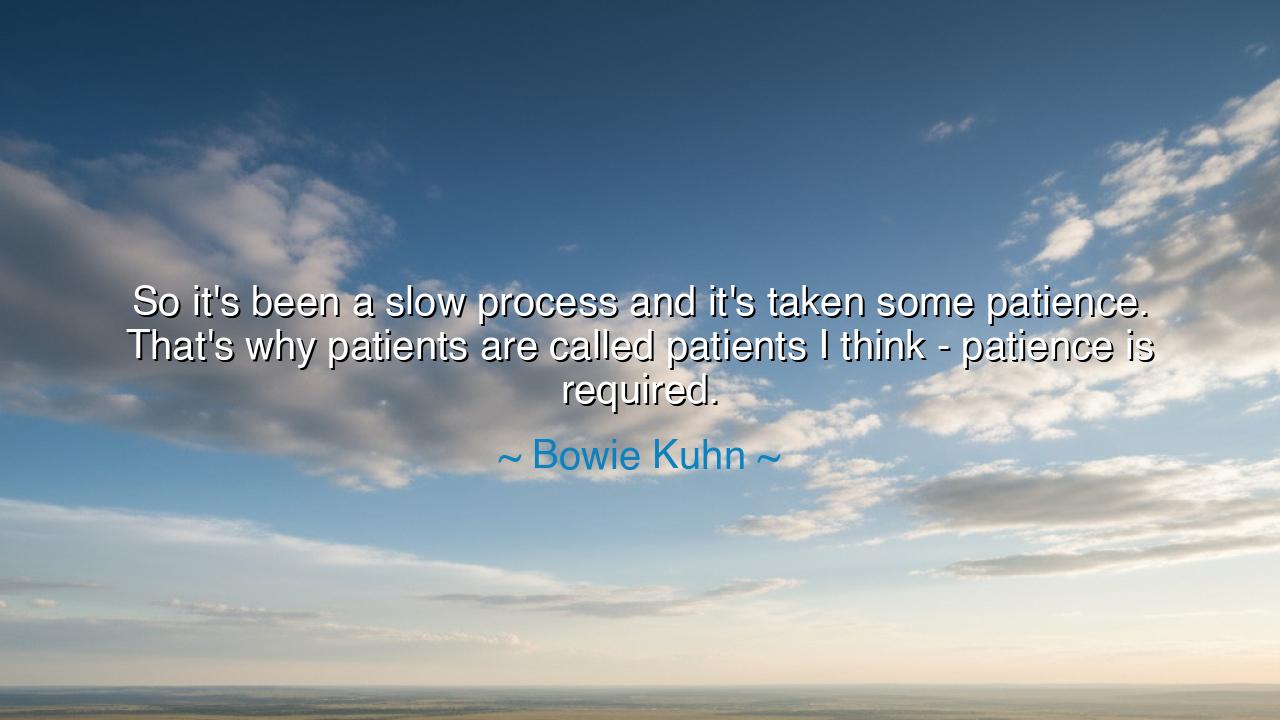
So it's been a slow process and it's taken some patience. That's
So it's been a slow process and it's taken some patience. That's why patients are called patients I think - patience is required.






Hear the words of Bowie Kuhn, spoken with the simplicity of truth and the weight of lived experience: “So it’s been a slow process and it’s taken some patience. That’s why patients are called patients I think – patience is required.” Though cast in gentle humor, these words carry the depth of ancient wisdom. They remind us that in the struggles of life—whether in healing, in labor, or in hope—there is no swifter road than the one paved with endurance. The body heals in time, the soul mends in time, and the fruits of toil ripen in time. Nothing great comes by rushing, and nothing true is born without waiting.
The ancients, too, spoke of this. The farmer who sows his seed does not dig each morning to see if the grain has sprouted; he knows that the harvest obeys the rhythm of the seasons, not the impatience of man. So it is with patients, those who lie in suffering or weakness. Their healing cannot be forced by haste; it comes through rest, care, and the slow work of nature. To endure sickness requires the same patience as the farmer awaiting the harvest. In this way, the word itself becomes a lesson: those who are patients must indeed learn patience.
Consider the story of Florence Nightingale, the Lady with the Lamp, who tended the wounded in the Crimean War. Her labor was not one of sudden miracles, but of tireless days and countless nights, offering care, cleanliness, and comfort until slowly, painfully, the sick began to recover. She understood what Kuhn’s words proclaim—that healing is a slow process, one that demands patience not only from the sufferer, but from all who serve them. In her perseverance, thousands were saved, and the practice of medicine was transformed.
This truth extends beyond the realm of illness. In every trial of life—whether building a craft, mending a friendship, or striving toward a dream—we are called to embrace the slow process. Impatience tempts us with shortcuts, but shortcuts often lead to ruin. The wall hastily built collapses; the word spoken in haste wounds; the journey rushed leaves us unprepared for the perils ahead. Patience, though hard, builds strength. It teaches endurance, it deepens wisdom, and it prepares us for victories that will endure.
Kuhn’s gentle play on words conceals a profound teaching: that suffering itself can be a school of patience. When we are weakened, we learn dependence; when we are delayed, we learn humility; when we are forced to wait, we learn faith. The name patient is not an accident—it is a reminder that in every human struggle, endurance is the first medicine. Those who refuse to wait cannot be healed, but those who endure with courage find renewal in body and spirit.
The lesson for us is clear. Do not despise the slow process, whether in health, in work, or in life. When you are ill, allow time for healing. When you labor, allow space for growth. When you hope, allow destiny to unfold at its own pace. Fill your waiting not with bitterness but with preparation, reflection, and trust. For in the end, patience is not passive; it is the strength to endure the trial until the reward appears.
Practical actions lie before you: when sickness comes, submit to the healing path without despair. When progress stalls, remind yourself that time is the forge of greatness. When life delays what you desire, turn your waiting into learning. Whisper to yourself the truth Kuhn revealed: that patients are called patients because patience is required. Let this truth be your comfort, your guide, and your strength.
Thus, let Bowie Kuhn’s words echo across the ages: the journey of healing, the journey of growth, the journey of becoming—these are all slow processes. But to the one who walks them with patience, the reward is not only recovery, but the forging of a spirit that no storm can break. And that spirit, once formed, becomes the true mark of health, wisdom, and life.






AAdministratorAdministrator
Welcome, honored guests. Please leave a comment, we will respond soon